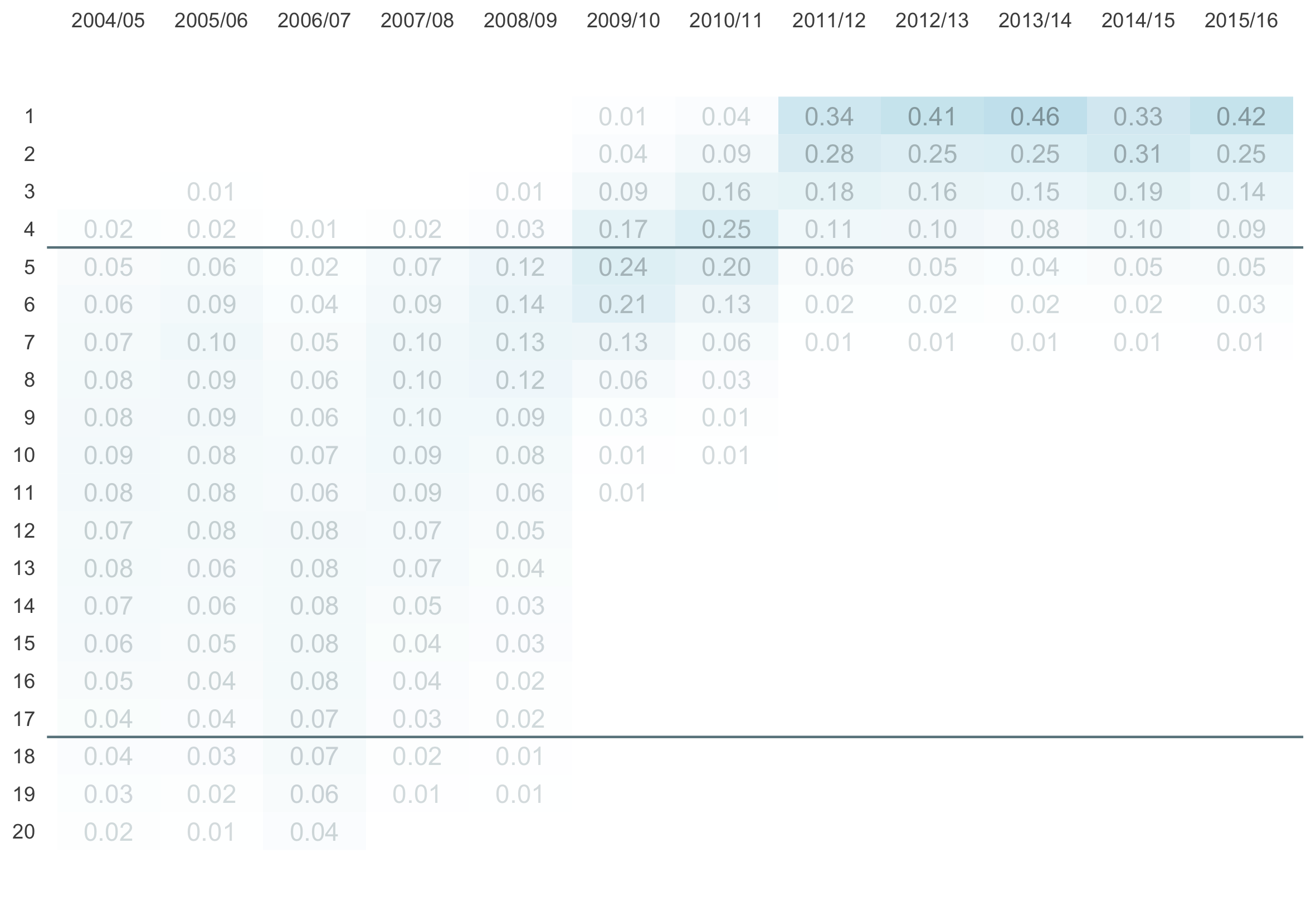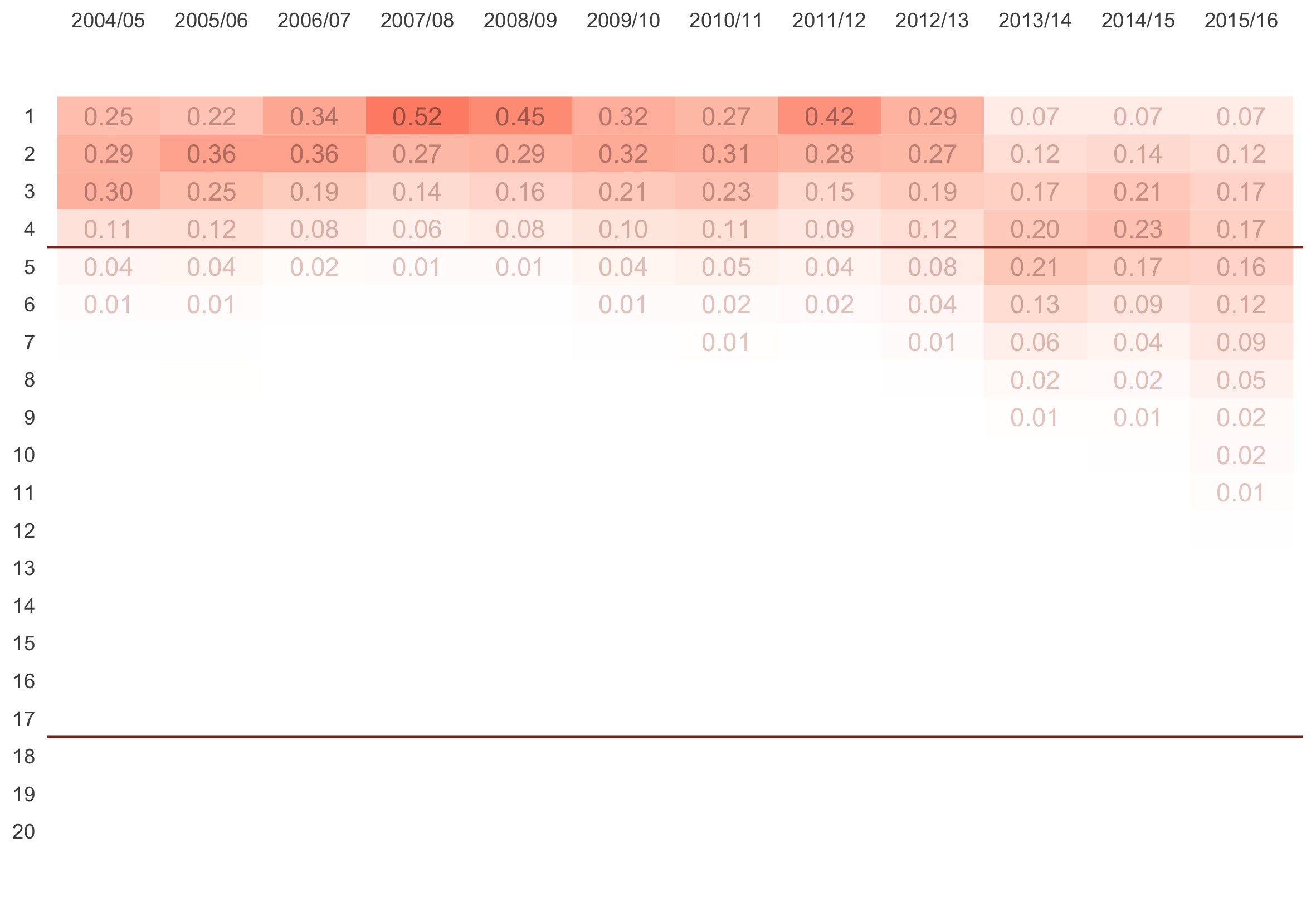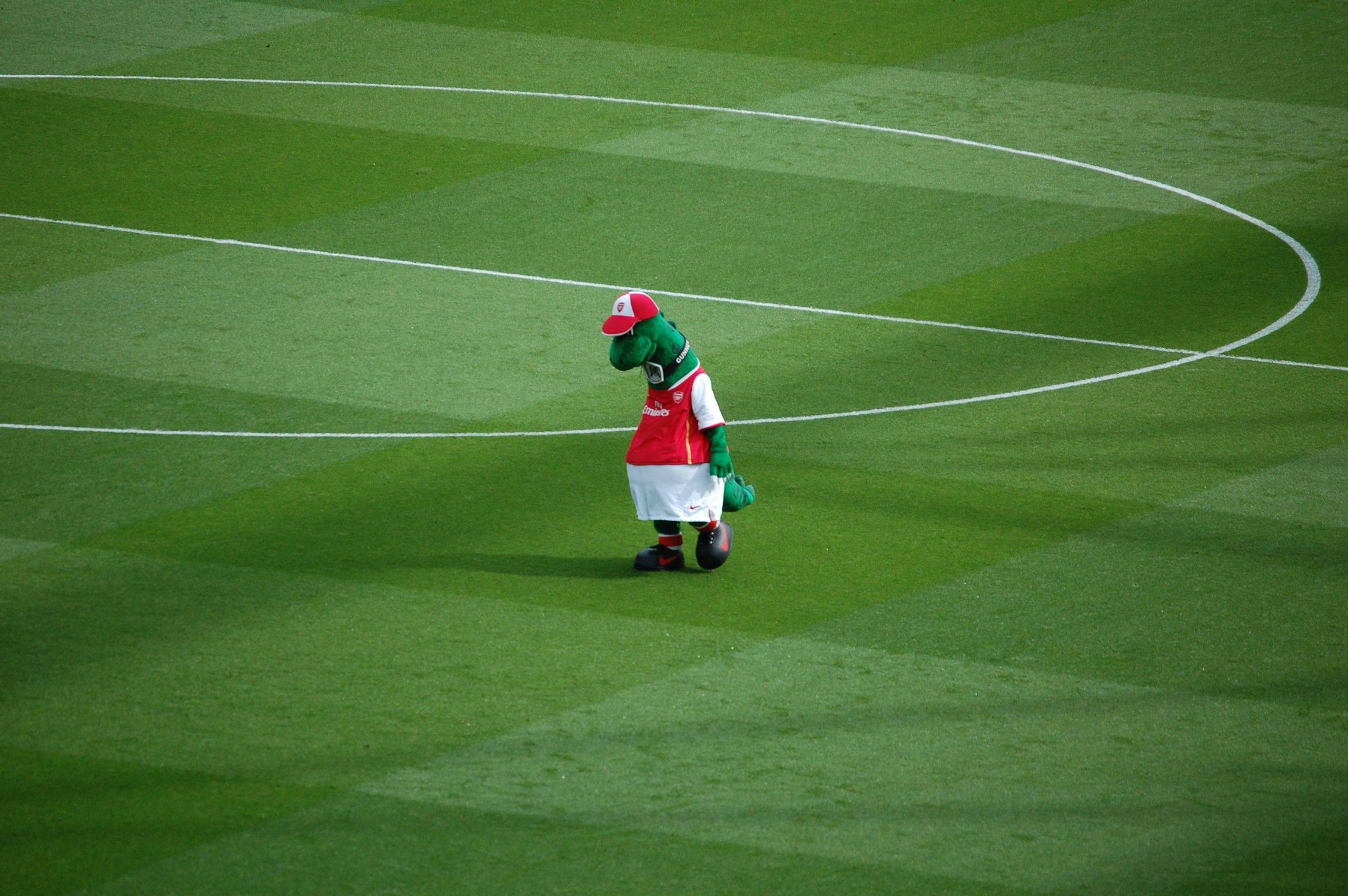 Arsenal have been a tremendously consistent team over the past decade. However, now the tide seems to be turning against Arsène Wenger. Many fans would happily trade in that consistency for a few more league titles. If you're the fourth best team in the league over 12 seasons, how many league titles should you expect to win? If variance can swing Leicester a league title, you would think it could have thrown a few Arsenal's way, too. This is the question that Chris Anderson (writer of The Numbers Game) asked on Twitter last week:
Arsenal have been a tremendously consistent team over the past decade. However, now the tide seems to be turning against Arsène Wenger. Many fans would happily trade in that consistency for a few more league titles. If you're the fourth best team in the league over 12 seasons, how many league titles should you expect to win? If variance can swing Leicester a league title, you would think it could have thrown a few Arsenal's way, too. This is the question that Chris Anderson (writer of The Numbers Game) asked on Twitter last week: 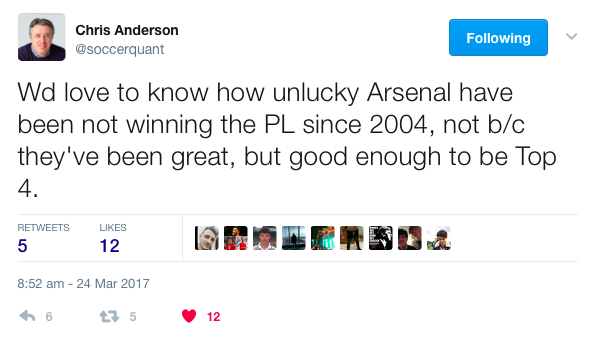 Fortunately, there are a couple of different ways we can try to answer this. One way is to use bookies' odds to estimate the probability of a team winning a match. Then, using these probabilities, we then simulate an entire season and estimate what the probability of a team winning the league really was. There are some problems with this method (see the appendix); however, it does allow us to get some ballpark numbers.
Fortunately, there are a couple of different ways we can try to answer this. One way is to use bookies' odds to estimate the probability of a team winning a match. Then, using these probabilities, we then simulate an entire season and estimate what the probability of a team winning the league really was. There are some problems with this method (see the appendix); however, it does allow us to get some ballpark numbers.
Zero league titles
So what is the chance of Arsenal winning no league titles since 2004? By the method described above, the probability of Arsenal winning 0 league titles from 2004/05 to 2015/16 (inclusive) is estimated at 14%. With a crude simulation like this, it’s probably not wise to read too much into the exact numbers. Nonetheless, this does suggest that Arsenal have been somewhat unlucky not to bring back a few titles over the last 10 years. So how many league titles should we have expected Arsenal to win? 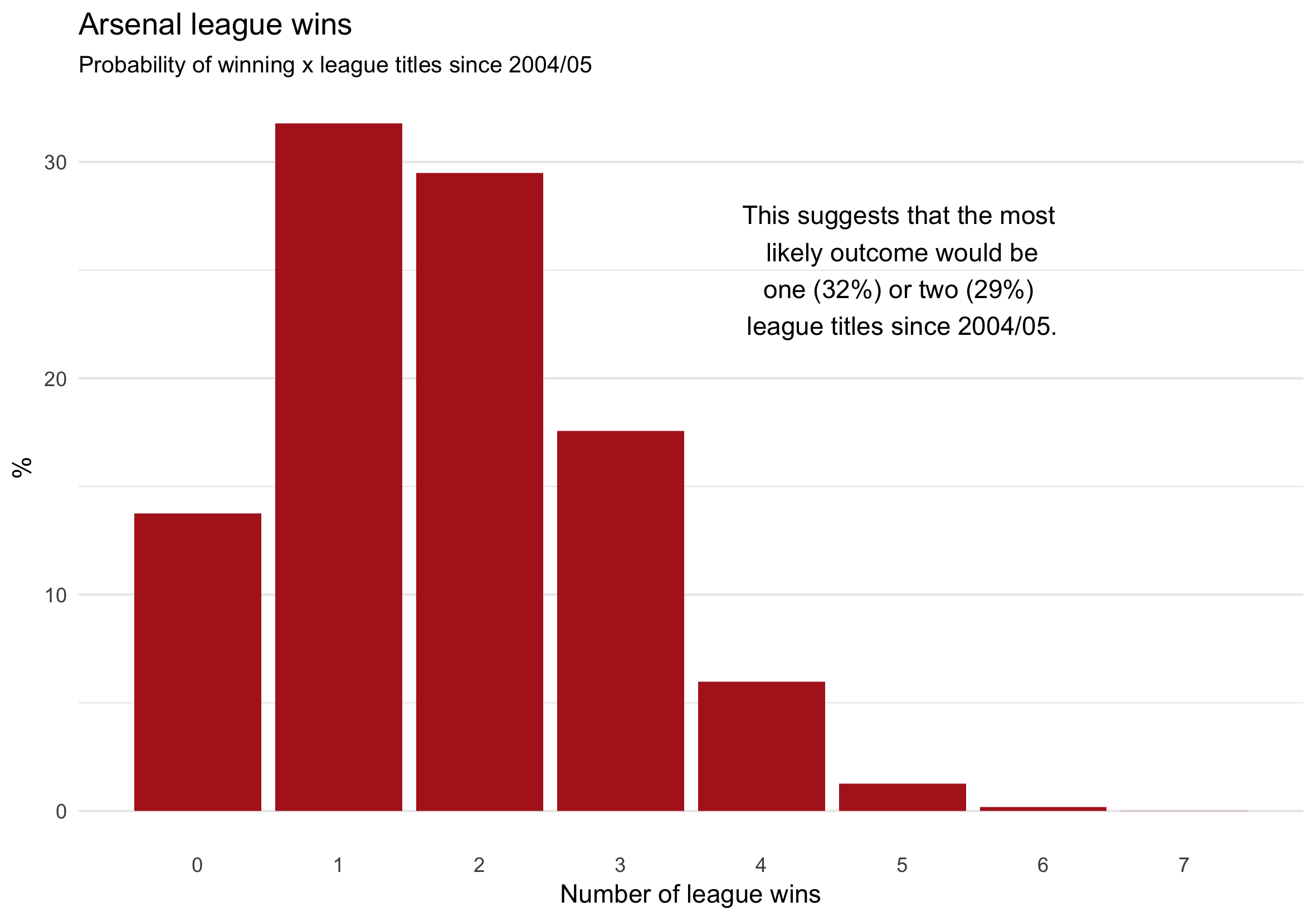
12 top four spots
It seems unfair to consider the bad luck Arsenal have had and yet not consider the good luck they have benefited from elsewhere. If failing to win a league title or two is unlikely given (the bookmakers’ opinion of) their overall performance, how unexpected is continued qualification for the Champion’s League? 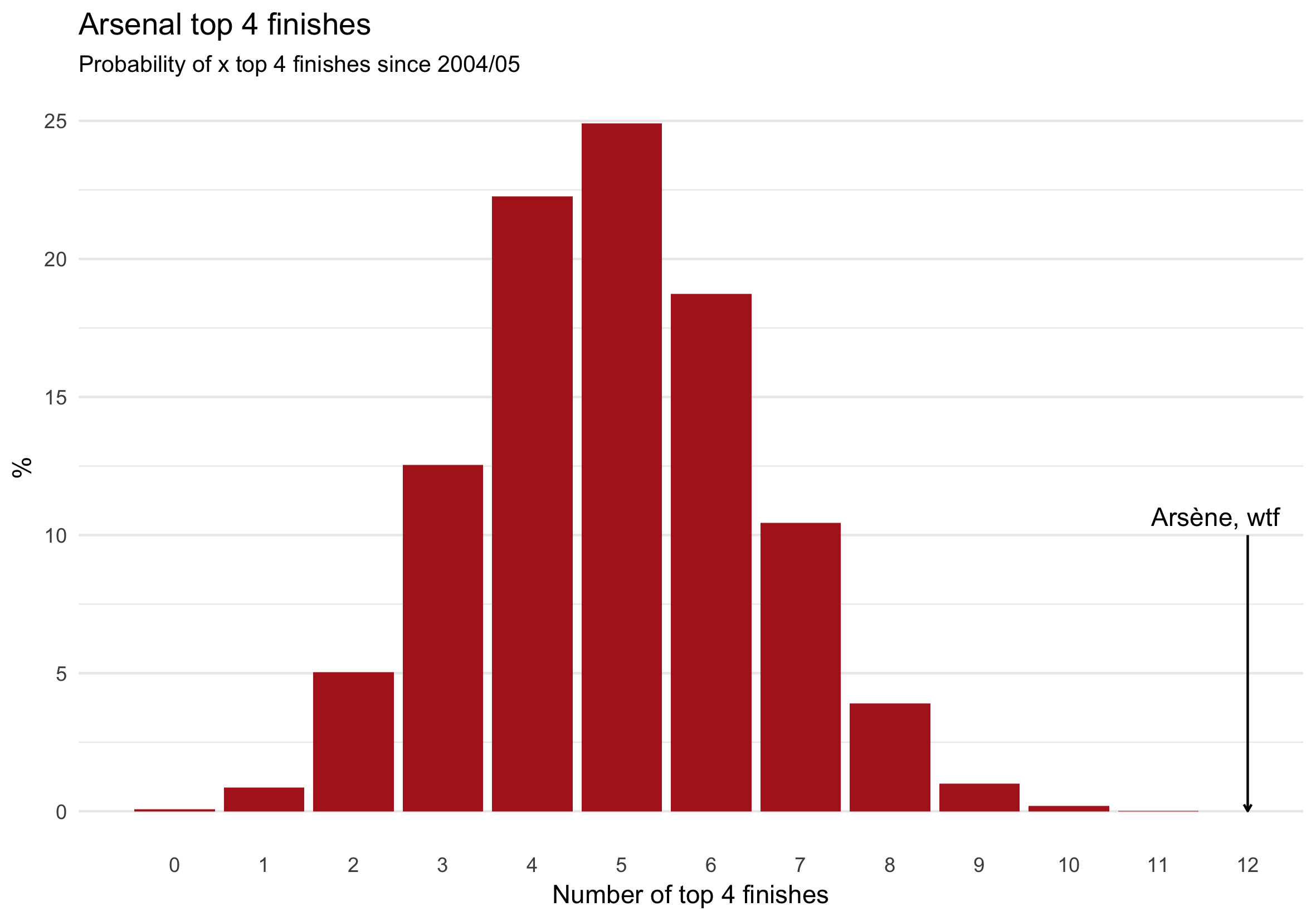
St Totteringham’s Day
According to Wikipedia, St Totteringham’s Day is “held on the day when Arsenal have gathered enough points to be mathematically assured to finish ahead of Tottenham in the league table”. Celebrated for generations without fail, there have been a few close calls in recent years (not to mention what will happen this year). 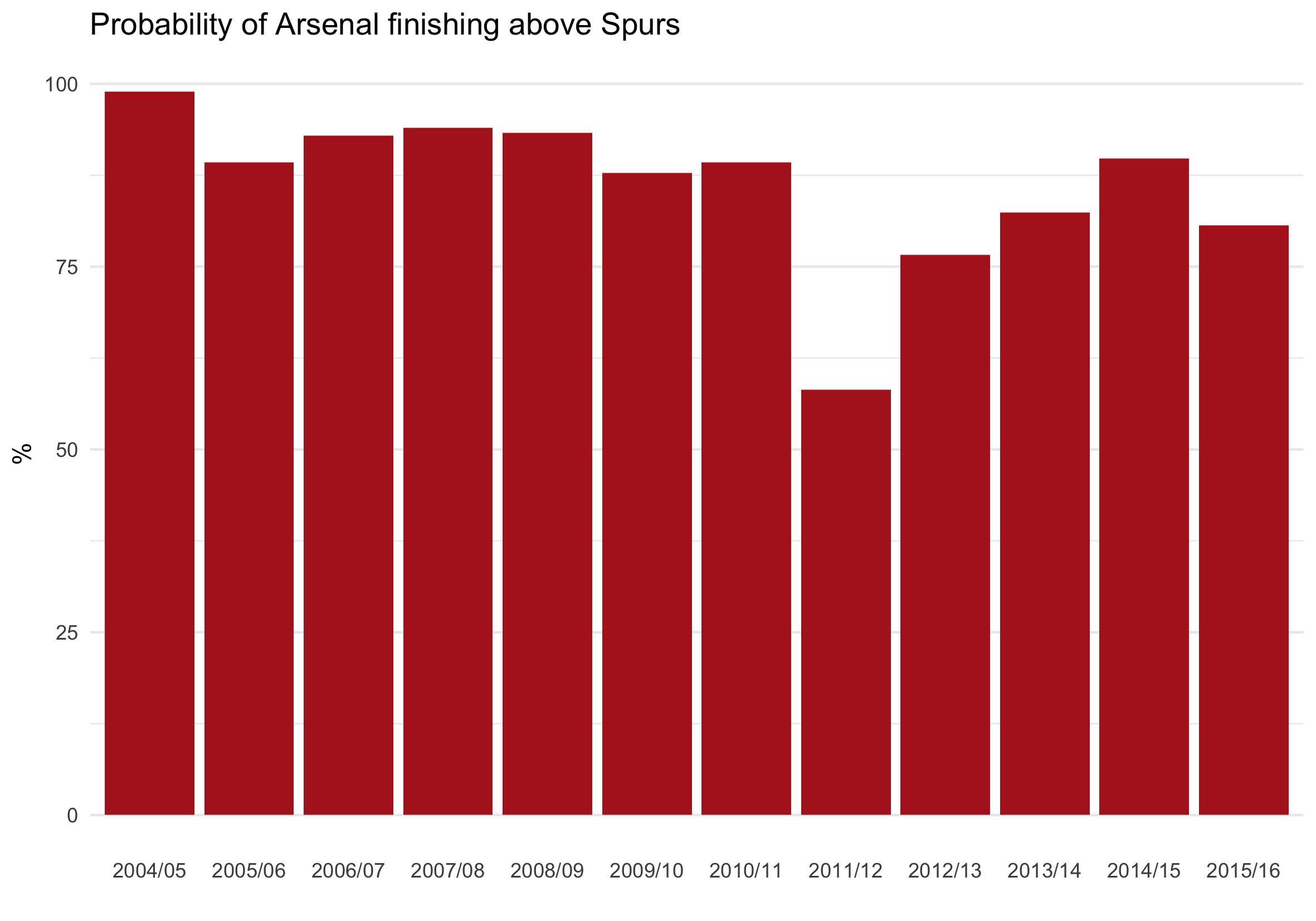
Although the individual probabilities remain high, the combined probability of Arsenal finishing above Tottenham on all of the last 12 seasons is just 15%. It is of course possible that there are some factors that the odds may not account for. However, even if you believe that the odds are missing an adjustment for Spursy-ness, it still represents an unlikely achievement. I don’t think it’s at all surprising to conclude that Arsenal were unlucky to miss out on a couple more league titles. I think most football fans could have imagined Arsenal taking the league at times in 2015/16 or 2007/08. It’s tempting to wonder what could have happened had everything gone their way just once. Old stars might have stayed; new stars might have joined. You can see how a bit of luck at the right time can kickstart a chain reaction of improvement (looking at you Chelsea 2011/12). Ultimately, looking at it like this misses the point. Most Arsenal fans aren’t disappointed by one missing title. Instead, it is the sheer repetitiveness of each season. Every year the same mistakes are made on and off the pitch. At least in Groundhog Day, Bill Murray learned a thing or two each time he woke up. A bit more silverware and the resulting improvements in the playing squad would have helped paper over the cracks. But football is (slowly) modernising and those who fail to learn from their mistakes risk falling behind.
Appendix
1. Figures
We can abstract the charts above a step further and look at the finishing probabilities of the team in each season since 2004/05. You can view the same charts for all Premier League teams on github.
Arsenal
Manchester City
Money, what money?
Manchester United
I wonder what happened circa 2013/14?
Chelsea
2. Nerd nonsense
Method
- Take bookmakers’ home/draw/away odds
- Convert odds to probabilities.
- Using prematch probabilities, simulate each game 10,000 times.
- For each simulation:
- Assign points to home and away teams (3 points for a win, 1 for a draw, 0 for a loss).
- Add up the points and sort to create a league table.
- In the event of a tie, teams on equal points are ordered randomly.
- For each season:
- Sum the number of times a team finished in each position.
- Divide by the total number of simulations (10,000) to estimate the probability of finishing in each position.
By taking the bookies’ probabilities game-by-game, in-season effects are, to some degree, taken into account. This means that in each of the simulations, all the injuries, managerial changes, suspensions and the like happen at the same time as they did in real life. This means that the resulting probabilities grossly underestimate the amount of uncertainty in a season of football. To use a specific example, the simulation does account for the possibility of Vardy, Mahrez or Kanté having a long term injury in 2015/16. In the same way, season-to-season changes aren’t accounted for. If Arsenal had won the league in 2010/11, it may have made keeping hold of their (and acquiring new) star players over the next few seasons that much easier.
Data
Data was originally sourced from football-data.co.uk. The odds used were from the following bookmakers:
- 2004/05: Bet365
- 2005 to 2012: Betbrain average
- 2012/13 to 2015/16: Pinnacle closing odds.
Code
The code, data and figures used for this analysis are on github.

